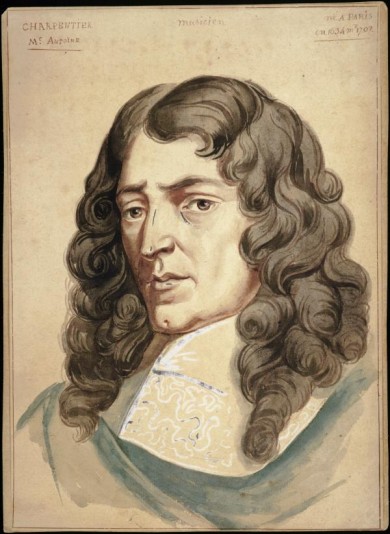Seraphic Fire spotlights Charpentier rarities in French Baroque program

Music of Marc-Antoine Charpentier dominated Seraphic Fire’s French Baroque program performed Wednesday night in Miami.
Seraphic Fire’s artistic director Patrick Quigley is a tireless explorer of rarely heard choral repertoire. Quigley turned to the French Baroque and the world of King Louis XIV for “The Glories of Versailles” Wednesday night at St. Sophia Greek Orthodox Church in Miami.
The music of Marc-Antoine Charpentier dominated a concert devoted to scores written for the palaces, chapels, convents and monasteries at Versailles during the era of the Sun King. Charpentier is best known for his Midnight Mass, often performed at Christmas Eve services. His liturgical scores are harmonically adventurous and rhythmically complex, influenced by Italian Baroque sacred and operatic compositions.
Like his fellow court composers, Charpentier set Latin texts but these works are sung in French Latin, a very different version of the language from the Italian and European Latin taught in schools and utilized for sacred works by countless composers. Quigley pointed out that this Gallic-inflected language has largely disappeared and pronunciation and articulation of musical texts is based on research and guesswork. The liturgical works for Versailles are highly ornamented, abounding in improvised trills, cadences and elaborate filigree.
Quigley’s thirteen-voice choir rose to these challenges in both solo and ensemble singing of impressive solidity and vibrato-less gleam, the often high vocal lines securely executed. Organ preludes and interludes were likewise improvisatory. Organist Olukola Owolabi brilliantly created processionals and introductory strophes that were totally idiomatic and seamlessly blended into the vocal music. The finely gauged continuo was shared by Patti Garvey on viola da gamba and Philip Spray on violone, the forerunner of the string bass.
Dividing the voices into three choirs, Charpentier’s Salve Regina spans a wide vocal range while his Laudate Dominum concludes with a joyous “Gloria patri,” the final Amen grand and aristocratic.
Charpentier’s Dixit Dominus contrasts a lilting melody for three male voices with the Baroque grandeur of the chorale, sung with appropriate devotional weight. Baritone Dan Moore ‘s warm, voluminous singing was a standout Wednesday and, in the lively final section, the clean, transparent voices of the choir in the extremely high register shone impressively in the cathedral’s resonant acoustic.
Operatic master Jean-Baptiste Lully’s own setting of Dixit Dominus is a lighter, more obviously Gallic version. The bright, incisive articulation and rhythmic fastidiousness of the female trio was outstanding, with soprano Esteli Gomez particularly distinguished in ease of declamation and ornamentation.
Three convent motets by Louis-Nicolas Clerambault culminated in a Motet pour le jour de Noel, adorned by the elegant lithe high soprano of Jolle Greenleaf.
Two works by Francois Couperin showcased a very different side of this master of the harpsichord. Tantum ergo sacramentum is a strongly devotional trio, the exceptional bass James K. Bass and ethereal sopranos of Greenleaf and Virginia Warnken handling the spare vocal strophes admirably. O Misterium ineffabile was a duo in the mould of Baroque opera. Gomez’s purity of tone and direct, communicative manner was potent and the strong contrast of timbres with Moore proved striking.
The generous program concluded with Charpentier’s oratorio Le Reniement de Saint Pierre. Based on the Biblical story of Peter’s denial of Jesus, the score assigns the role of Peter to a haute-contre, a rare vocal type that falls between tenor and countertenor. Steven Bradshaw was altogether extraordinary in this difficult role, producing tonal strength and lightness while giving full weight to the drama. As Jesus, Robert Strebendt’s fine lyric tenor and superb articulation of fast, elaborate trills was equally stunning. The final chorus of tears is harmonically exquisite and original, both tragic and uplifting. This great score was a wonderful conclusion to an evening of French rarities that should not be missed by any lover of choral music.
“The Glories of Versailles” will repeat 7:30 p.m. Thursday at St. Gregory’s Episcopal Church in Boca Raton; 8 p.m. Friday at First United Methodist Church in Coral Gables; 8 pm. Saturday at All Saints Episcopal Church in Ft. Lauderdale; and 4 p.m. Sunday at All Souls Episcopal Church in Miami Beach. seraphicfire.org; 305-285-9060.
Seraphic Fire will also perform Monteverdi’s Vespers of 1610 7 p.m. February 8 at the Basilica of the National Shrine of the Immaculate Conception in Washington, D.C.
Posted in Performances
Leave a Comment
Thu Jan 16, 2014
at 12:50 pm
No Comments






